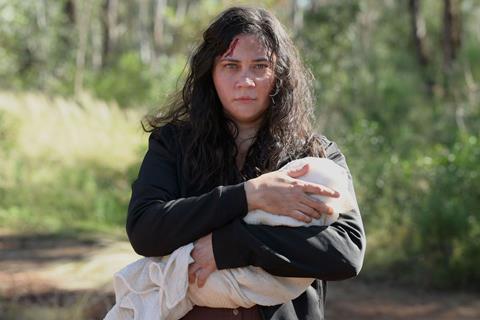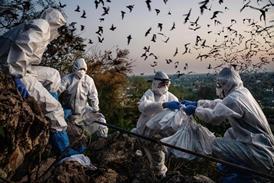Australia’s past comes back to haunt a new mother in the latest from the producers of ‘The Babadook’

Dir/scr: Jon Bell. Australia. 2023. 86mins
Spectres of the past hang heavy over The Moogai, both in terms of the historically appalling treatment of Australia’s native people by white settlers and ongoing generational tension within the Indigenous community. These themes hang so heavy, in fact, that they almost smother this story of an Aboriginal mother facing off against a malevolent child-stealing entity — ‘moogai’ in Bundjalung language — which has some genuinely unsettling moments, but is so determined to drive its point home that it hammers out any genuine tension.
Undercut by the weight of its own earnest message
Premiering in Sundance’s Midnight strand, The Moogai is adapted from Indigenous writer/director Jon Bell’s 2021 short, which won the Grand Jury Prize at that year’s Sundance. That should help draw attention, as will the fact that its produced by Kristina Ceyton and Samantha Jennings of Causeway Films, behind other Australian genre titles including last year’s horror smash Talk To Me, which also played Sundance, and Jennifer Kent’s The Babadook. Its head-on exploration of Indigenous themes will also be a draw for festivals and distributors.
LIke The Babadook, The Moogai also draws heavily on maternal emotions; here, not motivated by grief but rather the physical and psychological maelstrom created by the arrival of a newborn. Having suffered a heart attack turing the birth of her son Jacob, high-flying lawyer Sarah (Shari Sebbens) has already pushed her body to its limits and is soon plagued by sleepless nights and unsettling visions of long-haired girls in doorways and long-limbed shapes in corners that, despite the cultural specificity of this story, will be familiar to genre fans.
While her husband Fergus (Mayne Wyatt) is sympathetic, it is Sarah’s biological mother Ruth (Tessa Rose) — with whom Sarah has only just reconnected after being given up for adoption at birth — who best understands what her daughter is experiencing. Yet, initially, Sarah ridicules Ruth’s assertions that a demon is after Jacob and his older sister Chloe (Jahdeana Mary) and rejects her attempts to help with traditional rituals she says will banish evil such as smearing ochre on the walls and on the children and adorning the home with snakeskins. For Sarah, a successful modern woman who lives in a plush high-rise city apartment, her mother’s beliefs are entirely alien, her heritage a foreign language she simply cannot understand.
There is also a bitterness at play, too. Sarah carries a deep-seated pain at being given away as a baby and fails to appreciate, as an opening sequence has made clear to viewers, that it was not Ruth’s choice. Sarah was just one of the myriad victims of the white government’s brutal, long-standing assimilation policy.
Bell also successfully draws on the pressures of motherhood, playing on Sarah’s feelings that, through both a lack of sleep and a complete upheaval of her life, she is losing not only her mind but herself. Her journey from nightmares to angry outbursts and, eventually, a psychiatric ward is particularly swift, however and, like much of The Moogai, is dramatically contrived to make a point about the dismissive treatment of vulnerable (and, particularly, non-white) women, rather than playing out organically.
The film’s unsubtle parallels between the children stolen by the moogai and those forcibly taken by white authorities head rapidly towards a predictable showdown. This looks impressive, as Sarah and Ruth set up a ring of fire around an ancient tree in the middle of the vast landscape of the outback, captured in an overhead shot which emphasises their smallness and the high stakes of this fight.
Yet, when it is finally coaxed into the open, the moogai (played with athletic physicality by Paul Chambers) reveals itself to be a lacklustre patchwork of other movie monsters. Similarly, while The Moogai may have its roots in Australia’s Indigenous trauma, and tells a story which needs to be heard, it is ultimately undercut by the weight of its own earnest message.
Production companies: Causeway Films, No Coincidence Media
International sales: Bankside Films films@bankside-films.com
Producers: Kristina Ceyton, Samantha Jennings, Mitch Stanley
Cinematography: Sean Ryan
Production design: Bethany Ryan
Editing: Simon Njoo
Music: Steve Francis
Main cast: Shari Sebbens, Tessa Rose, Meyne Wyatt, Clarence Ryan, Bella Heathcote, Jahdeana Mary
























